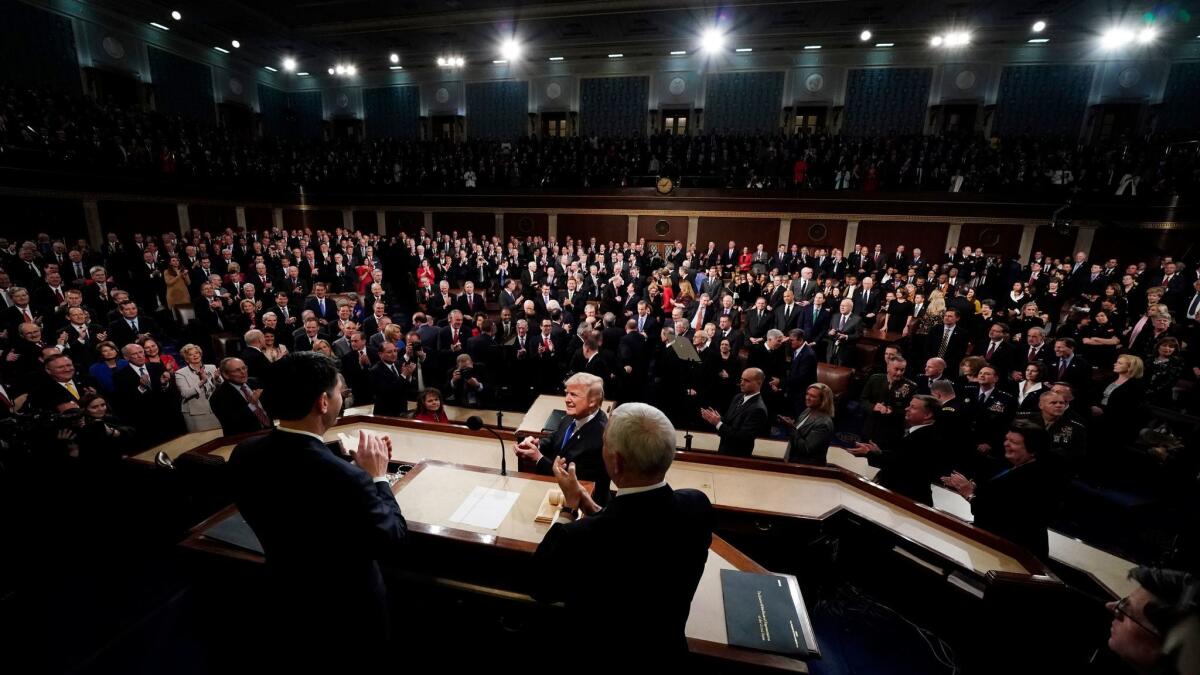Op-Ed: Well, that was dispiriting: Let’s make Trump’s State of the Union the last of its kind

- Share via
Another year, another dreary, partisan State of the Union address, not to mention hundreds of “previews” and after-the-fact analyses parsing the president’s every word. You can find examples of these in this paper and every other; turn on the television and you’ll find talking heads debating whether Donald Trump was “presidential.” Why must we put up with this every January?
Conservatives have long hated the State of the Union. We prefer a small, modest government, and to us the State of the Union has too many trappings of monarchy. The president stands above the Congress and the Supreme Court, telling everybody what to do. That is hardly a fit model for a republic. Many liberals, who now must endure being lectured for an hour by Trump, have also come around to the view that this annual event should cease to exist.
The Constitution, it’s true, requires the president “from time to time give to the Congress Information of the State of the Union, and recommend to their Consideration such Measures as he shall judge necessary and expedient.” But the Founding Fathers never had in mind the ridiculous spectacle that the State of the Union has become. It has evolved over the centuries in ways that track the changes in the government itself.
For most of the 19th century, the State of the Union was quite different. The president summarized data from the diplomatic corps, the land offices, the Treasury and other executive departments in a written letter to Congress. This was in keeping with the founding view that the Congress was the main branch of government; the job of the president was to help it draft better laws.
That was basically how the government worked: Congress as the supreme branch, and the executive and courts in a secondary role. There were exceptions, no doubt, like the presidencies of Andrew Jackson and Abraham Lincoln. Still, the first 125 years or so of our government really had Congress at the center.
Everything began to change in the early 1900s. Woodrow Wilson, who sought to assert presidential dominance over the legislature, was also the first to deliver the State of the Union in person in more than a century. He used the occasion not simply to provide useful information, but to jawbone the legislature into approving his agenda. Subsequent presidents followed suit.
In the 1960s, the State of the Union was televised for the first time, which changed the political calculus even more. It was no longer about the president trying to influence Congress, but the public at large. The State of the Union became a public-relations opportunity that no president would dare pass up, a rare chance to address tens of millions of Americans.
The State of the Union is sadly representative of our dysfunctional civics.
An unfortunate consequence of this shift is all the pandering presidents now do in the State of the Union. They strain to give every major demographic group a shout-out, not to mention the special guests — all attempts to move public opinion.
This pandering, in turn, has marginalized Congress all the more. What reason do legislators even need to be there? They don’t really learn anything new about the actual state of the American union. On Tuesday night, the legislature was little more than a set piece, as the president tried to sway the broader public to support his agenda.
In this way, the State of the Union is sadly representative of our dysfunctional civics. Whereas the Founding Fathers thought that Congress should be the “keystone of the Washington establishment,” as political scientist Morris Fiorina once put it, the legislature is now a national laughingstock. Most Americans have long disapproved of the job Congress does, and instead look to the president to actually govern.
If I had my way, Tuesday’s State of the Union would be the last of its kind. Let’s go back to the old way of doing things — the president and his advisors summarize relevant information about the country, in writing, to help the legislature govern. No pageantry necessary.
More than this, let’s go back to the founding vision that places Congress at the center of our government. For too long, we have assumed that strong presidential leadership is enough to run a nation as big and diverse as ours — and have let Congress fall to pieces. Underfunded, understaffed, too quick to pass problems off to the executive and the courts, the Congress of 2018 is simply incapable of being the first branch of the government. We need to fix that.
All of us — Republicans and Democrats, liberals and conservatives — should channel our civic energy into reinvigorating Congress, to make it more useful than a pretty backdrop for yet another State of the Union speech.
Jay Cost is a contributing editor at the Weekly Standard and author of “The Price of Greatness: James Madison, Alexander Hamilton, and the Creation of American Oligarchy.”
Follow the Opinion section on Twitter @latimesopinion or Facebook
More to Read
A cure for the common opinion
Get thought-provoking perspectives with our weekly newsletter.
You may occasionally receive promotional content from the Los Angeles Times.






